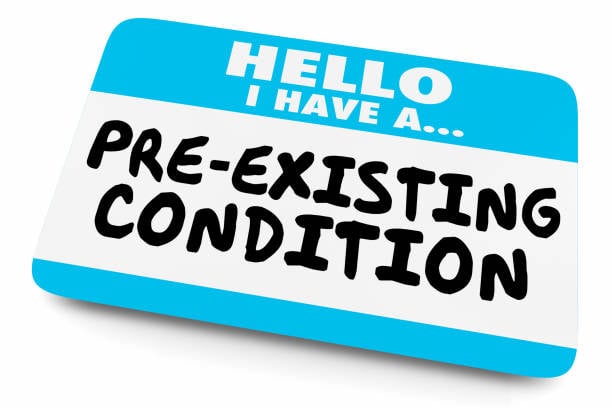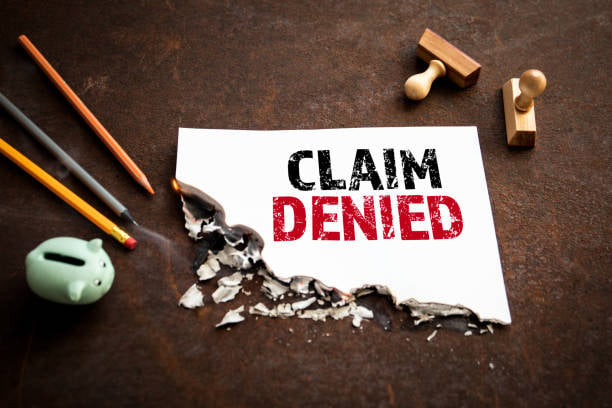Best life insurance for those with pre-existing conditions: A smart investment
Don't let a pre-existing condition prevent you from having life insurance. Discover your options and secure your future with the help of our guide.
When it comes to purchasing life insurance, it’s important to be aware of what a pre-existing condition is and how it can affect your cover. A pre-existing condition might include anything from high blood pressure to cancer and can have a significant impact on the cost and cover of your policy. This article provides a comprehensive guide to available policies for those with pre-existing conditions, including insurance costs, factors that enhance insurability, the application process, and alternatives if you can't get cover.

Health | Life | Trauma | Total and Permanent Disability | Income Protection
Learn more on different types of insurance from an expert licenced financial adviser and see what's best for your circumstances.

Learn more about different types of insurance from a licenced financial adviser and see what's best for your circumstances.
Health | Life | Trauma | Total and Permanent Disability | Income Protection
Do you need life insurance?
Life insurance is a promise to secure your loved ones' future on death. Here's why it matters:
- Financial security: Life insurance provides a financial backup for your family on death.
- Debt protection: It can help cover debts, rents, mortgages, and loans, relieving your loved ones from the burden.
- Income replacement: Helps replace the income of the deceased life assured to enable the family to maintain a similar lifestyle to that if the life assured had continued working until retirement.
- Education support: Ensures your children's education remains uninterrupted, no matter what.
- Funeral costs: Eases the financial strain by covering funeral expenses.
- Peace of mind: Knowing that your loved ones are taken care of even after you're gone offers invaluable peace of mind.
What is a pre-existing condition?
A pre-existing condition refers to any medical condition, diagnosed or not, existing before the insurance policy start date.
Pre-existing medical conditions can vary in severity, treatment options, and prognosis. Some conditions can be effectively managed, while others may require ongoing or specialised treatment and support. Understanding what constitutes a pre-existing condition is important for figuring out how it will impact the cost and eligibility of your life insurance cover. Revealing pre-existing conditions during your life insurance application process will help determine appropriate cover and prevent any issues when subsequently making a claim.
Taking the time to research the options available ensures that life insurance becomes a smart investment for you and your family.

What health issues do insurers identify as ‘pre-existing’?
All health issues are identified as pre-existing conditions and you are required to disclose any conditions throughout the application process up to any time before the cover is put in place. Some pre-existing conditions require ongoing treatment and support and can cause disability, or limit daily activities. As a result, the insurance provider may require higher premiums or exclude these conditions from the policy altogether. Some common pre-existing conditions include:
- Chronic conditions, such as cancer, stroke, diabetes, heart disease, obesity, asthma, and amyotrophic lateral sclerosis;
- Neurological disorders, including multiple sclerosis, fibromyalgia, head injury, dementia, Alzheimer’s disease, epilepsy, cerebral aneurysm, and Parkinson’s disease;
- Musculoskeletal conditions, such as arthritis, scoliosis, and osteoporosis;
- High blood pressure, a common health condition that can cause other illnesses over time;
- Kidney diseases, which are abnormalities of the kidneys, such as end-stage renal disease, kidney stones, lupus nephritis, and nephropathy;
- Infectious diseases, such as human immunodeficiency virus, human papillomavirus, Covid-19, ebola, and hepatitis; and
- Mental health conditions, such as depression, anxiety, or bipolar disorder, may be considered as pre-existing conditions which could increase the risk of suicide.
Insurers can also use prescription drug data to identify pre-existing conditions. For example, a person taking medication for high blood pressure may indicate that they have a pre-existing condition. Remember to disclose all medications during the application process to ensure accurate cover and premium calculations. Moreover, it’s a good idea to read and understand the specifics of any life insurance plan to know in advance whether it covers your health problem or medical condition.
Talk to a Policywise adviser for guidance on how to interpret the nuances of any plan - it’s much easier to make good decisions with an informed adviser at your side, and Policywise’s service is fast and free.
How do life insurance providers manage pre-existing medical conditions?
Insurance companies take different approaches when determining cover eligibility for individuals with pre-existing conditions. Private life insurance providers in New Zealand typically assess applicants on a case-by-case basis.
Depending on the severity and nature of the condition, the insurer may offer cover with certain exclusions, limited cover amounts, restrictions on the type of policy, additional features, or higher premiums. In some cases, the insurer may decline cover altogether. Disclosing any pre-existing medical conditions when applying for life insurance will ensure that the policy accurately reflects the individual's health status and avoid any potential issues with claims in the future.

Can I get life insurance if I have a pre-existing condition?
Life insurance is an essential aspect of financial planning, providing peace of mind for individuals and families. However, obtaining cover can be challenging for individuals with pre-existing medical conditions. Here are some factors to consider:
- Impact of pre-existing conditions on insurance premiums: Pre-existing medical conditions usually result in higher insurance premiums, with the severity and impact of the condition on an individual's health being key factors in determining the cost of the policy. Insurance companies assess the risk of pre-existing conditions to determine whether your insurance costs need to change, with higher risk resulting in higher costs.
- Application process: The life insurance application process for those with pre-existing conditions involves providing medical records and/or answering medical questions. It may also require a medical exam or blood test.
- Factors that improve insurability: Maintaining a stable medical condition, complying with medical treatment, and having a healthy lifestyle can improve your insurability.
It’s important to shop around and compare life insurers to find the best policy for your needs. Working with an experienced insurance agent or broker (you can talk to a Policywise adviser about this) can also help you navigate the process and find the right policy at a reasonable cost.
Insurance options for pre-existing conditions
Individuals with pre-existing conditions have various options for obtaining life insurance, and the type of cover will reflect your unique situation. Some employers offer group life insurance that covers pre-existing conditions instantly, but that cover may be a limited sum insured.
For those who cannot obtain traditional life insurance, alternative options are usually available but with higher premiums or lower cover, such as:
- Accidental death: If you're not eligible or have been denied life insurance, then this policy will make things easier. Accidental death insurance pays a lump sum of money if you pass away as a result of an accident and can be used for income support, paying bills, mortgages, rent, childcare, and funeral costs.
When considering life insurance cover with pre-existing conditions, individuals can decide between underwritten and non-underwritten cover.
- Underwritten cover involves answering questions and often undergoing a medical examination to assess the level of risk.
- Non-underwritten cover does not require a medical examination but often has higher premiums and lower cover limits.
It's important to research and find insurance companies that specialise in covering pre-existing conditions and weigh the pros and cons of each option to determine the best fit for individual situations.
Life insurance policy exclusions
Understanding the meaning of exclusions is indispensable before purchasing a policy as they are added to reduce the likelihood of an early payout due to untimely death. If you have pre-existing conditions, it’s wise to know how your policy exclusions may affect your cover.
Some common exclusions include:
- Suicide: Most life insurance policies have a suicide exclusion clause, which means that the policy will not pay out if the insured dies as a result of suicide within a specified period after the policy is issued.
- Misrepresentation: If the insured misrepresents their health or medical history on the application, the policy may be voided and the insurer may refuse to pay out.
- Pre-existing conditions: Many life insurance policies have exclusions for pre-existing conditions. This means that if the insured dies as a result of a condition they are not covered for, the policy may not pay out. But if the insured dies due to a new condition discovered after their policy was issued, the policy may pay out.

Policywise: your partner in making wise insurance decisions
Policywise is a 100% free service which tells you which health, life, and disability insurance provider best fits your needs. We offer fast, comprehensive, and easy-to-understand comparisons of all leading providers, and a simple summary clearly recommending which insurer is best for your situation.
Not all insurance policies are the same. Policywise can help you sort out the duds, avoid the lemons, understand the fine print and exclusions, and get the right insurance for you and your family.
We make the important decision of where to buy your insurance super easy. We’ll answer your questions, provide experienced advice, quotes, and comparisons, and manage all the back and forth throughout the application process. Taking out your cover through us means you'll have our lifetime support and claims advocacy, and we'll help you negotiate a positive outcome at claim time. We can also take care of lodging any claims on your behalf and back you up if the going gets tough.
Check out the reviews on our homepage for how other New Zealanders have found our service because now is the time to get your life insurance sorted. Give your family or someone you love the most outstanding financial support possible. Book a 5-minute callback with Policywise today; our service is fast and free.
Conclusion
While life insurance is a smart investment, it’s critical to understand what constitutes a pre-existing condition, how insurance companies identify pre-existing conditions, and which policy exclusions are applicable, especially since the outset of the Covid-19 pandemic. By researching and considering all available options, individuals with pre-existing conditions can make informed decisions and ensure they have the cover they need.
Disclaimer: This article is for general information only. Nothing in this blog or on this website is intended as medical, dietary, or financial advice. Although we aim to update our content regularly, you are advised to consult a Policywise adviser, health professional, or an appropriate specialist before acting on any information herein. They can factor in your personal circumstances or preferences and help guide your decision-making process.
Quickly find the cover that’s best for you
Policywise tells you which health, life or disability insurance best matches your circumstances, 100% free. Talk to one of our insurance advisers to find out which health or life insurance is best for you.
References
Image Source: Market Business News. Nordqvist, C. (2021). How to save money on life insurance, with Diabetes. Retrieved 14/03/2023 https://marketbusinessnews.com/life-insurance-diabetes/193912/
Bankrate. Pope, C. (2023). What are Life Insurance Exclusions? Retrieved 14/03/2023 https://www.bankrate.com/insurance/life-insurance/exclusions/
InsurancesafeNZ. (2020). Covering your pre-existing conditions. Retrieved 14/03/2023 https://www.insurancesafenz.com/Article/cover-for-your-medical-conditions
Insurance Brokers USA. (2022). Awesome Life Insurance Tips for those with GERD and/or Barrett’s Esophagus. Retrieved 14/03/2023 https://insurancebrokersusa.com/valuable-life-insurance-cover-tips-for-people-that-have-been-diagnosed-with-gerd/
Life Direct. (n.d.) Health insurance for a pre-existing condition. Retrieved 14/03/2023 https://www.lifedirect.co.nz/article/health-insurance-for-a-pre-existing-condition#:~:text=Most%20insurers%20in%20New%20Zealand,%E2%80%9Cstand%2Ddown%E2%80%9D%20period
National Foundation for Infectious Diseases. Infectious Diseases. Retrieved 14/03/2023 https://www.nfid.org/infectious-diseases/
National Kidney Federation. (2022). What is Kidney Disease. Retrieved 14/03/2023 https://www.kidney.org.uk/what-is-kidney-disease
New York State Department of Health. (2021). Chronic Diseases and Conditions. Retrieved 14/03/2023 https://www.health.ny.gov/diseases/chronic/
Shine Lawyers New Zealand. (n.d.). Pre-existing medical conditions and health insurance – a guide. Retrieved 14/03/2023 https://www.shinelawyers.co.nz/blog/insurance/pre-existing-medical-conditions-and-health-insurance/
ON THIS PAGE
Download our insurance comparison chart
We need a few details before we can send you this content…
* All fields are required

